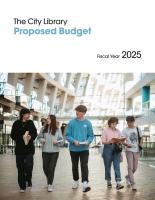Building Consensus Around a Future Focused Budget
Salt Lake City Public Library
Innovation Synopsis
In early 2024, the Salt Lake City Public Library welcomed a new CEO and CFO who were unfamiliar with the organization and its budget history. At the same time, the Library was developing its budget for the upcoming fiscal year. Historically, each manager submitted individual budget requests without insight into other branches' needs, resulting in over 30 separate meetings, each lasting at least 90 minutes. Executives had to navigate these presentations and remember details from over 60 hours of discussions, making decision-making challenging.
To overcome this, the Library implemented a collaborative approach, streamlining the process and fostering better communication. This innovation led to the approval of the largest property tax increase in the Library’s history and set the stage for a multi-year plan focused on financial sustainability.
Challenge/Opportunity
After recent executive changes, staff faced uncertainty as they adjusted to a new CEO while developing the next fiscal year’s budget. Managers had varied understanding of budgeting and limited visibility into each other's needs due to a previous system of isolated, pitch-like budget presentations. The whole process consumed 50+ hours, making it difficult for executives to retain details and make well-informed budgeting decisions.
The Library had recently undertaken major capital projects, including a Main Library roof renovation, which depleted reserves and led to decision-maker fatigue due to cost overruns and construction issues. Amid these challenges, the Library identified $12 million in additional budget requests and over $65 million in future capital needs, including repairs, new locations, and branch renovations. This situation was compounded by new leadership unfamiliar with the organization’s budget history and varying levels of managerial understanding and siloed information.
Key Elements of Innovation
Internally, the focus was on transparently discussing the organization's needs with the entire management team, not just a small group of executives. After managers submitted initial budget requests, the team held three collaborative work sessions to prioritize and assess the impact of these requests. During discussions, managers saw the potential impact on property tax rates. Alongside the proposed tax increase, contingency projects were identified for potential unplanned revenue, and a 10-year financial forecast was developed for future needs.
Engagement with external stakeholders was also key. The executive team met individually with city council members before public meetings, allowing them to experience funding request elements firsthand and provide feedback. This proactive approach led to a successful and more positive budget presentation to the city council.
Achieved Outcomes
A number of outcomes from this effort will make an immediate impact and set the Library on a positive financial trajectory. The Library’s Board of Directors and the Salt Lake City Council both approved the proposed budget unanimously, including a property tax increase of $5.3 million (21%) to address operational needs for multiple years. Through this process, City leadership also agreed to propose a significant bond for the Library’s capital needs in two years, avoiding the burden of a property tax increase and bond proposal in the same year.
This budget development process also produced significant benefits internally. The Library’s management team experienced increased comradery and benefited from improved transparency throughout the holistic process. In addition, 159 staff participated in and provided positive feedback on budget presentations by the CEO and CFO. Managers and staff have expressed interest in the staff presentations continuing in future budget cycles.
Additional Materials:



